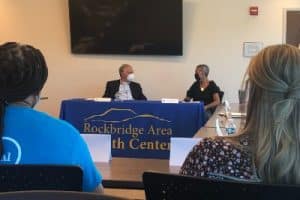
The Inflation Reduction Act will reduce prescription costs for Americans, but expansion of Medicaid in Virginia has reduced healthcare costs for Virginians.
Sen. Tim Kaine held a roundtable at Rockbridge Area Health Center in Lexington Wednesday with patients and area health center staff to discuss the challenges health centers struggle with every day.
“I want to hear from all of you,” Kaine, a member of the U.S. Senate’s Health, Education, Labor & Pensions Committee, said. “The work you do in local health centers is really important.”
Kaine said key issues for healthcare right now are subsidies under the Affordable Care Act, Medicare prescription costs, and additional financing of the Black Lung Benefit program.
Senator Creigh Deeds was also in attendance.
“We’re partners on this trying to create opportunity to have Medicaid expansion,” Kaine said of Deeds.
Deeds said that physical conservatism means that you keep your people healthy and protect your workforce, and access to healthcare provides protection, including Medicaid.
Amanda Tomlin receives behavioral health and dental services as a patient of Rockbridge Area Health Center. She began recovery eight years ago for opioid use disorder and credits RAHC for her recovery.
“This whole facility is just amazing,” she said.
Kaine asked if she had attempted treatment for recovery at other facilities and she said she went to Covington for help, but doctors would only prescribe medication.
“This is the first place that I’ve found that has been out for the patient,” Tomlin said. “And they’re out for their wellbeing.”
Brittany Ambrogi is pregnant with her fifth child. She moved to Lexington from North Carolina in 2014. She began coming to RAHC with her fourth pregnancy.
She receives well-woman exams, family planning, pregnancy, primary care, dental and behavioral health services at RAHC. Her children receive pediatric care at RAHC. Her previous pregnancy was high risk. Without RAHC, she would not be able to receive health care services.
“They’ve just been a wealth of [important resources],” Ambrogi said of RAHC.
Her youngest son had jaundice at one week of age and was treated at RAHC.
Kaine shared his story that his son also had jaundice a few days after he was born and a family friend who was a doctor encouraged him and his wife to seek treatment.
Lucy Strowbridge is a U.S. Army veteran and receives medical and dental care at RAHC. A patient for six years, she previously worked at the health center for seven years. She retired a year ago and six months ago began working for Americare. Strowbridge said that veterans cannot visit the Veterans Administration for dental care unless their service injury was dental related.
Kimberely Slaughter, Pharmacy Director of New Horizons Healthcare, spoke about the importance of Virginia keeping 340B medications available to underserved patients.
“What is so important about the 340B program is the ability no. 1 to get people their meds, but also the whole purpose of 340 is we are making those cost savings, and we are putting those cost savings back into the center so that we can expand to dental, women’s health, open access,” Slaughter said. “Keeping 340B alive and going is critical to these patients who just don’t have access.”
Kaine said that U.S. Rep. Abigail Spanberger is working on legislation to protect 340B and he will sponsor the bill in the Senate.
“We’re going to do everything we can to make sure 340B is protected,” Kaine said. About 2/3 of the committee supports 340B and a small minority questions the importance of 340B.
If 340B is lost in Virginia, Tracy Douglas, CEO of the Virginia Community Healthcare Association, said that five or six health centers she knows of in the state would have to rethink funding of services.
“It’s very instrumental for the revenue for the health centers,” she said.
Another concern for health centers in 2022 is if the public health emergency created by COVID-19 ends. Douglas said that 450,000 to 470,000 beneficiaries in Virginia could lose funding.
“We are required to see our patients. We are not going to turn our patients away regardless of their ability to pay,” she said of the dedication of health centers to treat patients. She said health centers want the flexibility to rethink funding and continue to help patients. “It’s extremely important that we’re able to continue to keep our doors open and provide the kind of services that we need to provide for you.”
Kaine spoke of the state budget.
“I think the support for [health centers] is quite bipartisan,” he said. He feels “very optimistic about budgeting levels.”

Telehealth during the COVID-19 pandemic made healthcare accessible and convenient, and Kaine said the Senate understands that going back to life without telehealth is not an option.
Tish Amirault, CEO of Highland Medical Center, said that in Highland County the medical center found that many patients did not have Internet. The health center provided patients with iPads so they could sit in the parking lot and speak with physicians via telehealth.
“Our Medicaid patients love it, and they don’t want to come back [to in-person appointments] because they’re more comfortable in their own space,” Amirault said. Medicaid expansion made it possible for the medical center to provide iPads for patients.
Chelsey Tomlin of Johnson Health Center said that providing just an audio service for patients has been a helpful option.
Angie Martin said that with mental health patients, some cannot leave their homes because of depression. Telehealth provided an option.
“It’s very important. It’s changed our no-show landscape,” Martin said. Patients do not cancel appointments because they can telehealth with physicians.
A.J. “Jay” Lewis II is a member of Rockbridge County Board of Supervisors.
“We here believe in the mission and support the health center,” Lewis said.
Lexington Mayor Frank Friedman said the health center has been “a tremendous asset to the entire community.”
“If you want health, maintain health,” Friedman said.










